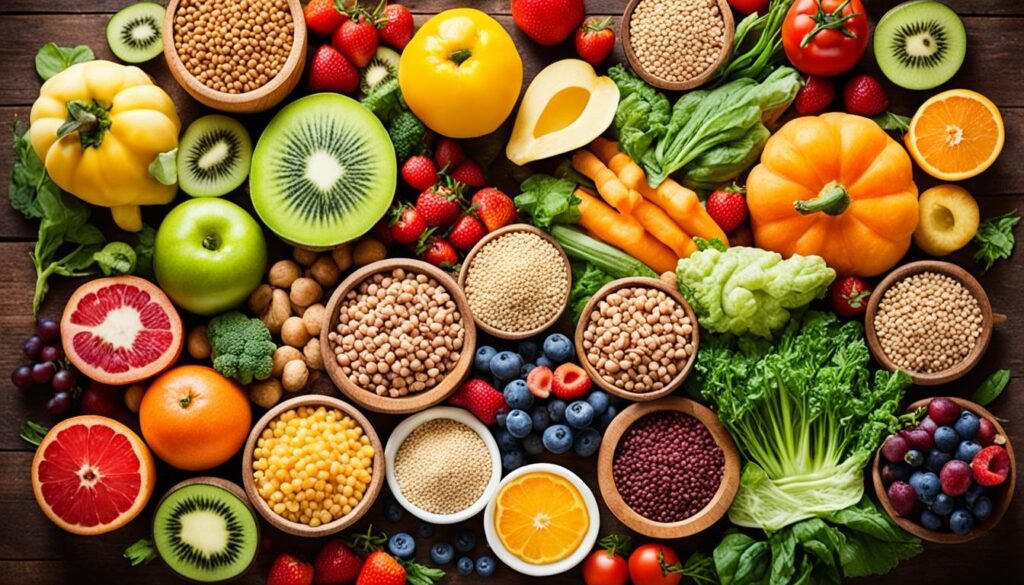Did you know 10% to 20% of adults suffer from gas and bloating? The average person might pass gas up to 25 times daily. Though gas is a natural part of digestion, too much can be uncomfortable and embarrassing. Luckily, numerous natural remedies offer effective relief for these symptoms.
In this article, we explore why gas and bloating happen. We’ll show you how to use natural remedies in your daily life. This will help you improve your digestion and feel better. By learning about the causes and making simple changes, you can find natural ways to feel comfortable again.
Understanding the Causes of Gas
Intestinal gas is part of the digestion process, containing various gases. It arises mainly from bacterial fermentation of undigested carbohydrates and by swallowing air from particular behaviors and food.
Bacterial Fermentation
Lactose intolerance and eating gas-producing foods like beans increase gas production. This happens when undigested carbohydrates are broken down by bacteria inside you. The result is the release of gas.
Behaviors, Food Choices, and Activity
Behaviors that make you swallow more air can cause gas. These include talking while eating, chewing gum, and using straws. Consuming carbonated drinks and foods like beans increases gas too.
Understanding the roots of gas helps you find ways to manage it better.
Behaviors and Foods That Can Lead to Gas
Some behaviors and food choices make gas and bloating worse. If you talk while eating or eat when upset, you may swallow more air. This can lead to more gas and feeling uncomfortable. Also, using straws, chewing gum, and drinking very hot or cold drinks add to the problem.
Problematic Behaviors
Talking while eating can make you swallow extra air. This leads to burping, feeling bloated, and passing gas. Smoking and using straws or sport bottles can have the same effect. Chewing gum or sipping on very hot or cold drinks might also cause more gas in your stomach.
Gas-Causing Foods
Some foods are well-known for causing more gas. These include carbonated drinks, spicy or fried foods, and vegetables like broccoli and cabbage. Also, onions, beans, and sugar alcohols found in artificial sweeteners like sorbitol and mannitol can make you gassy. Keeping track of what you eat in a diary could help you find your gas trigger foods. This way, you can change your diet to feel better.

To avoid gas, it’s good to know what actions and foods to watch out for. By making careful changes to what you eat and how you eat, you can lessen gas and bloating. This can help manage other stomach problems too.
Beating the Bloat
Gas is normal in digestion, but too much bloating is bad news. To beat the bloat and feel better, small changes make a big difference. These include eating differently and choosing drinks wisely.
Start by eating slowly and chewing food thoroughly. This stops you from swallowing extra air that causes gas and bloating. Eating smaller, more frequent meals is good for digestion and reducing bloat. Also, pick room temperature drinks over very hot or cold ones.
Denture wearers, make sure they fit to avoid swallowing more air. For everyone, moving around more can push gas out. Sitting straight after eating keeps bloat away. It’s okay to eat some gas-producing foods. They’re healthy. Just start with a little and work your way up.

natural remedies for gas
There are several natural ways to deal with gas and bloating. For those who want to solve their tummy problems without lots of meds, these can be great. These remedies work well for many people.
Herbal Teas and Spices
Herbs and spices like peppermint and chamomile are known for easing gas. They help gas move out of the body. Also, spices such as anise, caraway, and turmeric can be very helpful too.
If you drink herbal teas, they can help lessen bloating. They make it easier for the gas to leave your body. This can cut down on how uncomfortable you feel.
Peppermint Supplements
Peppermint supplements might also be a good choice. They relax your stomach’s muscles, which can stop gas pain. Often, they are in capsules that won’t dissolve in your stomach, letting them work where they are needed.
Peppermint oil can also help with gas. It has a calming effect on your digestive system. This can make you feel less bloated and gassy.
Probiotics
Probiotics add good bacteria to your gut. They are good for more than just gas. They have had success in easing irritable bowel symptoms, including gas and bloating.
They make your stomach healthier overall. This healthier gut can lead to less gas and bloating. So, taking probiotics regularly might make a big difference.
It’s wise to talk to your doctor before you start any new supplement. This is important. They can make sure it won’t be a problem with any other medicine you’re taking. They can also check if it’s safe for any health issues you might have.
Over-the-Counter Remedies
Aside from home solutions, over-the-counter (OTC) products can help with gas and bloating. Brands like Gas-X and Mylanta Gas contain simethicone. This helps break up gas bubbles. Activated charcoal is known for trapping gas to reduce bloat. Beano and lactase supplements also break down certain foods that cause gas. Remember, always read the label and talk to your doctor if you’re on other medicines.
Simethicone Products
Gas-X, Mylanta Gas, and Phazyme fall under simethicone products. They work to break down gas bubbles. This makes passing gas easier and reduces uncomfortable bloating.
Activated Charcoal
Activated charcoal is a common find for gas relief. It absorbs gas molecules. This process helps ease gas and bloating issues.
Enzyme Supplements
Supplements like Beano contain something that breaks down gas-causing foods. And for those with lactose intolerance, products like Lactaid or Dairy Ease offer help by adding the missing enzyme.
When to Seek Medical Attention
Occasional gas and slight tummy pain often go away with changes in what you eat. If these symptoms become more frequent, severe, or move to a new location, it might be time to see a doctor. Also, if you’re losing weight, having diarrhea, vomiting, or heartburn with the gas, don’t ignore it.
Long-lasting or intense gas could point to something bigger, like irritable bowel syndrome, inflammatory bowel disease, or lactose intolerance. Getting checked by a doctor is important. They can figure out what’s causing your discomfort and help you treat it.
Quick Relief Methods
When gas makes you uncomfortable or in pain, quick fixes can help. The fastest way is to pass stool. It lets out built-up gas.
Putting heat on your tummy with a hot water bottle or heating pad works too. It helps your muscles relax and lets the gas move better. It feels good and helps the gas come out.
Doing deep breathing exercises also helps move the gas. Breathe in slowly and deeply. It makes your body work better at releasing gas and helps your digestion.
These methods don’t fix gas for good, but they do ease pain and discomfort fast. Use these together to control gas. They can give you a break until you find a long-term solution.
Lifestyle and Dietary Adjustments
Want to cut down on gas? Adjusting your daily habits and what you eat could really help. Start by changing the way you eat. So, eat slowly, chew your food well, and try having several small meals during the day. This stops you from swallowing too much air and helps your body digest food better. It’s also vital to find ways to manage stress. Trying out meditation, yoga, or talking to a counselor can be very effective. This is because stress often leads to digestive problems, including excess gas.
Find out which foods make you gassy. For many, these are items like dairy, beans, or veggies like broccoli. Then, cut down on eating them. By doing this and improving your mealtime and stress management strategies, you’ll feel better in the long run. It will boost both your digestive health and how you feel each day.
Free to Read Comprehensive Book on Herbal Healing
Introducing “Over 350 Barbara O’Neill Inspired Herbal Healing Home Remedies & Natural Medicine” a comprehensive book on herbal healing with over 350 remedies. It covers ailments like throat pain effectively. This book is a goldmine for using herbs to treat common health issues.
This guide covers a wide array of topics such as respiratory and digestive problems, skincare, and more. It provides clear details and how-to’s. Readers will learn how to benefit from herbal healing.
We are offering this book to read online for free as part of our mission to spread knowledge. We have agreed with the author and the publisher to share this book at no cost, even though the Kindle version is sold for $9.99 and the paperback for $26.99. If you prefer a physical copy for easier access to the information and recipes, and to support the author, you can purchase it on Amazon using the link below or add it to your cart for a future purchase. The physical copy allows you to easily use the index to find specific recipes or remedies, and it makes a wonderful gift for a loved one or someone you care about and their health.
Read The Book For Free Online Now
https://readloversassociation.com/350barbarainspiredty/
Click the link below if you prefer the paperback version of the book.
Conclusion
Gas and bloating happen to almost everyone and they can be quite uncomfortable. Luckily, there are many simple ways to find relief. You can change your diet and lifestyle, and use natural remedies like herbal teas and peppermint to help. Even probiotics can make a big difference. These steps can help you feel better overall.
It’s okay to have gas from time to time, but if it’s happening often or the symptoms are strong, it might be good to talk to a doctor. They can make sure there’s nothing serious going on. By following a few tips to lessen gas and bloating, you could significantly improve how you feel every day. These tricks can also turn into habits that are good for your digestive system over the long term.
FAQ
What are the main causes of intestinal gas?
What types of foods and behaviors can contribute to gas and bloating?
How can I effectively reduce bloating?
What natural remedies can provide relief from gas and bloating?
What over-the-counter products can help with gas and bloating?
When should I seek medical attention for gas and bloating?
What are some quick-acting methods to relieve trapped gas?
How can I make long-term improvements to my digestive health and prevent excessive gas?
Source Links
- https://www.brighamandwomens.org/patients-and-families/meals-and-nutrition/bwh-nutrition-and-wellness-hub/special-topics/gas-beat-the-bloat
- https://www.medicalnewstoday.com/articles/321504
- https://www.everydayhealth.com/excessive-gas/home-remedies-for-gas/
- https://www.medicalnewstoday.com/articles/322525
- https://www.verywellhealth.com/how-to-relieve-gas-pains-fast-4140258
- https://www.forbes.com/health/wellness/trapped-gas-remedies/
- https://www.healthline.com/health/immediate-relief-for-trapped-gas-home-remedies-and-prevention-tips
- https://www.mayoclinic.org/diseases-conditions/gas-and-gas-pains/diagnosis-treatment/drc-20372714
- https://www.gastroconsa.com/gas-and-bloating-when-you-should-see-a-doctor/
- https://www.niddk.nih.gov/health-information/digestive-diseases/gas-digestive-tract/eating-diet-nutrition
- https://www.webmd.com/digestive-disorders/features/secrets-gas-control
- https://www.healthline.com/nutrition/proven-ways-to-reduce-bloating
- https://pharmeasy.in/blog/home-remedies-for-gas/
- https://www.ncbi.nlm.nih.gov/pmc/articles/PMC4893422/


